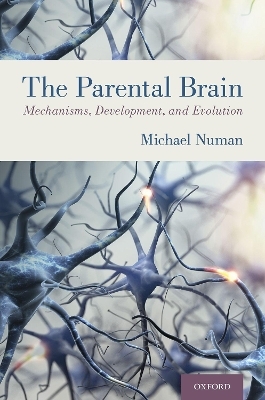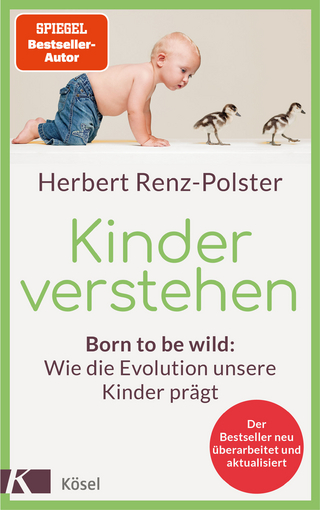
The Parental Brain
Oxford University Press Inc (Verlag)
978-0-19-084867-5 (ISBN)
The Parental Brain: Mechanisms, Development, and Evolution presents a comprehensive analysis of how the brain regulates parental behavior in nonhuman animals and in humans, how these brain mechanisms develop, and how such development can go awry, leading to faulty parental behavior. Further, the proposal is examined that the maternal brain served as a foundation or template for the evolution of other types of strong prosocial bonds in mammals, such as the hyper-prosociality that occurs in humans. Unique aspects of this book are its multilevel perspective and the integration and comparison of animal and human research in order to create a complete understanding of the parental brain.
Topics covered include the following:
· Maternal, paternal, and alloparental behavior
· Hormonal regulation of parental behavior
· Oxytocin and parental behavior
· Subcortical neural circuits regulating parental behavior in nonhuman mammals
· The interactions between cortical and subcortical neural circuits that are associated with parental cognitions, emotions, and behavior in humans
· How maternal care directed toward one's infants influences the development of the parental brain in the affected infants
· The intergenerational transmission or continuity of normal and abnormal maternal behavior
· The involvement of epigenetics and gene by environment interactions in the development of the parental brain
· Evolutionary perspectives on the parental brain, particularly with respect to alloparenting and cooperative breeding that have provided a framework for appreciating how the parental brain could have provided a foundation for the hyper-prosociality that occurs within human social groups
This book will be a valuable resource for behavioral neuroscientists and neuroendocrinologists, social neuroscientists, developmental psychobiologists and psychologists, anthropologists, and evolutionary psychologists with an interest in parental behavior, mother-infant relationships, child development, and the evolution of prosocial behavior.
Michael Numan received his PhD from the University of Chicago. He is a Fellow of the American Association for the Advancement of Science (AAAS) and the Association for Psychological Science (APS). His research focuses on the neural mechanisms of maternal behavior. He was a Professor of Psychology at Boston College (1975-2012), and he is currently a Research Professor of Psychology at the University of New Mexico-Albuquerque.
Chapter 1. Introduction
Chapter 2. Parental Behavior: Descriptions, Terms, and Definitions
1. Parental Behavior in Vertebrates
2. Parental Behavior in Mammals
Chapter 3. Hormonal Control of Maternal Behavior in Nonhuman Mammals
1. Introduction
2. Hormonal Regulation of Maternal Behavior in Rats, Rabbits, and Sheep
3. Hormones and Maternal Behavior in Mice
4. The Maintenance of Maternal Behavior and the Onset-Maintenance Dichotomy in Rats
Rabbits, and Sheep
5. Hormones and Maternal Behavior in Nonhuman Primates
6. General Conclusions
Chapter 4. Brain Mechanisms Regulating Maternal Behavior in Nonhuman Mammals: Oxytocin and Olfaction
1. Introduction
2. A Tour of the Rodent Brain
3. Oxytocin and Maternal Behavior
4. Olfaction and Maternal Behavior in Rodents, Rabbits, and Sheep
5. General Conclusions
Chapter 5. Central Neural Circuits Regulating Maternal Behavior in Nonhuman Mammals
1. Introduction
2. The Essential Role of the Medial Preoptic Area
3. The Larger Neural Circuitry within Which the MPOA Operates to Influence Maternal
Behavior
4. Neural Plasticity within Maternal Brain Circuits, the Maintenance of Maternal Behavior, and
Maternal Memory
5. General Conclusions
Chapter 6. Anxiety Reduction and Maternal Aggression in Postpartum Nonhuman Mammals
1. Introduction
2. Behavioral Characteristics of the Postpartum Reduction in Fearfulness
3. Behavioral Characteristics of the Postpartum Increase in Maternal Aggression
4. Opposing Roles of Oxytocin (OT) and Corticotropin-Releasing Factor (CRF) in Anxiety-
Related Behaviors
5. The Neural Circuitry of Maternal Aggression
6. The Neural Circuitry of Fear/Anxiety and the Mechanisms Mediating its Postpartum
Downregulation
7. Critical Evaluation of the Hypothesis that Decreased Activity within Fear/Anxiety Neural
Circuits Exerts a Permissive Effect on the Occurrence of Maternal Aggression by Releasing
Aggression Circuits from Inhibition
8. The Effects of High Activity within CRF Neural Systems on Infant-Directed Maternal Behavior
9. Conclusions
Chapter 7. Alloparental Behavior and Paternal Behavior in Nonhuman Mammals
1. Introduction
2. The Laboratory Mouse as an Experimental Model of Allomaternal behavior
3. Alloparental Behavior in Prairie Voles
4. Alloparental Behavior in Marmosets and Tamarins
5. Conclusions on Alloparenting
6. Naturally Occurring Paternal Behavior
7. Experimentally-Induced Paternal Behavior in Mammalian Species that Naturally Exhibit a
Uniparental Maternal Care System
8. Conclusions on Paternal Behavior
Chapter 8. The Parental Brain in Humans
1. Introduction
2. Subcortical Neural Regions and Circuits Implicated in the Maternal Behavior of Women
3. Cortical Neural Regions and Circuits Relevant to Maternal Behavior in Women
4. Cortical Neural Activations Associated with Maternal Responsiveness in Women
5. Postpartum Depression
6. The Paternal Brain in Men
7. General Conclusions
Chapter 9. Development of the Parental Brain in Nonhuman Mammals
1. Introduction
2. Normal Variations in Maternal Licking/Grooming of Pups Affect the Development of the
MPOA-to-VTA-to-NA Circuit in Rodent Offspring
3. Normal Variations in Maternal Licking/Grooming of Pups Affect the Development of
Neural Circuits that Regulate Stress Reactivity, Fearfulness, and Anxiety in Rodent Offspring
4. The Effects of Various Forms of Maternal Neglect of a Young Infant on the Subsequent
Development of Maternal Behavior and its Associated Neural Systems in the Affected Infant
5. Conclusions
Chapter 10. Development of the Parental Brain in Humans
1. Introduction
2. The Intergenerational Transmission of Maternal Responsiveness: A Behavioral Analysis
3. Normal Variations in Parental Behavior are Related to the Development of the Parental Brain
in Offspring
4. The Relationships Between Abnormal Parental Care and the Development of Neural Circuits
that Could Impact Parental Behavior in the Affected Offspring
5. Conclusions
Chapter 11. Evolutionary Perspectives on the Parental Brain
1. Introduction
2. Brain Modifications that May Underpin Alloparental Behavior
3. MPOA Interactions with the Mesolimbic DA System Regulate the Appetitive Aspects of
Maternal Behavior, Male Sexual Behavior, and Female Sexual Behavior
4. Modifications to the Core MPOA-to-VTA-DA Circuit and the Formation of an Enduring
Mother-Infant Bond in Mammals
5. The Neural Mechanism of the Mother-Infant Bond: A Potential Neural Foundation for the
Enduring Pair Bond that Forms between Mates in Socially Monogamous Mammalian Species
6. The Potential Contribution of Maternal Neural Circuits to the Neural Basis of Human
Hyper-Cooperation and Hyper-Prosociality
7. Conclusions
| Erscheinungsdatum | 28.05.2020 |
|---|---|
| Verlagsort | New York |
| Sprache | englisch |
| Maße | 236 x 157 mm |
| Gewicht | 998 g |
| Themenwelt | Sachbuch/Ratgeber ► Gesundheit / Leben / Psychologie ► Familie / Erziehung |
| Naturwissenschaften ► Biologie ► Humanbiologie | |
| Naturwissenschaften ► Biologie ► Zoologie | |
| ISBN-10 | 0-19-084867-7 / 0190848677 |
| ISBN-13 | 978-0-19-084867-5 / 9780190848675 |
| Zustand | Neuware |
| Informationen gemäß Produktsicherheitsverordnung (GPSR) | |
| Haben Sie eine Frage zum Produkt? |
aus dem Bereich


